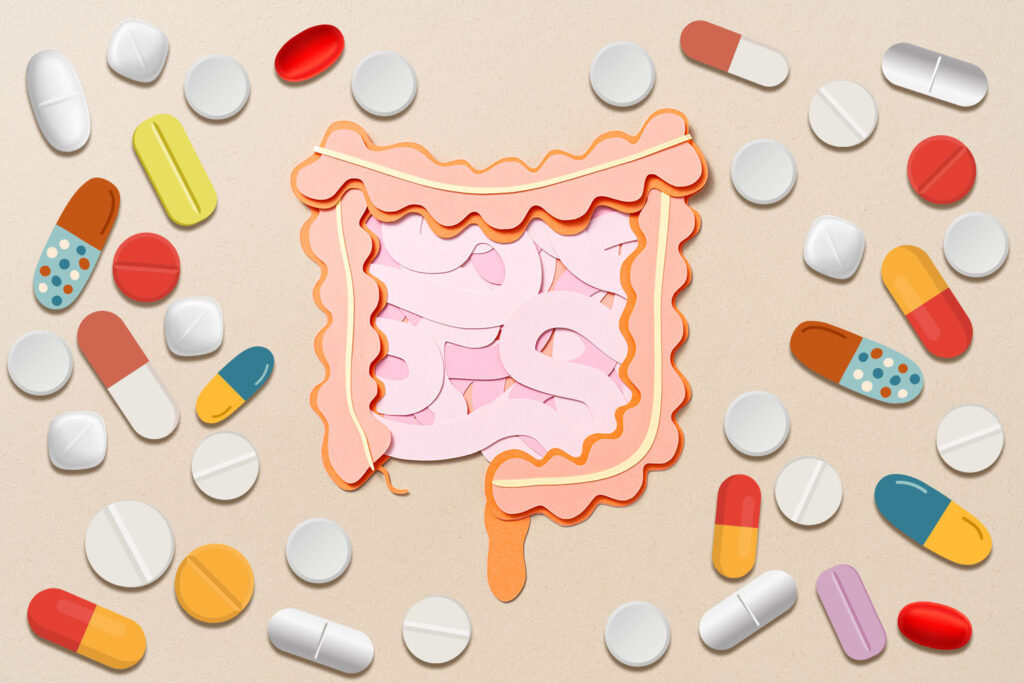MILLIONS of Brits popping pills for everyday health problems could be unknowingly harming their guts, scientists from Estonia warn.
Antidepressants and heartburn tablets are among the drugs that can wreak long-lasting havoc on your gut bacteria – even long after you stop taking them.
This is because the medicines get rid of the “good” microbes in the gut which are thought to boost the digestive system’s protective barrier.
This is a problem previously linked to skin problems like acne, inflammation, weakened immunity and even certain types of cancer.
Beta blockers, prescribed around 50 million times a year in the UK to treat high blood pressure and heart problems, were found to be among the worst offenders.
The researchers from the University of Tartu discovered that the changes the drugs caused could still be detected years after people stopped taking them.
The same was true for antidepressant medication, which the most recent NHS data from 2023/24 suggests is taken by almost nine millions Brits each year
Popular acid reflux pills known as proton pump inhibitors (PPIs), which include omeprazole and lansoprazole, also had similar effects on the gut.
Different NHS data show more than 73 million PPI prescriptions were dished out in England in 2022/23 alone, making them some of the most prescribed drugs in England.
Antibiotics — the most devastating and long-lasting offenders — are prescribed around 30 million times a year in the UK
Lead author of the study, Dr Oliver Aasmet, said: “Most microbiome studies only consider current medications.
“But our results show that past drug use can be just as important as it is a surprisingly strong factor in explaining individual microbiome differences.”
For the study, published in the journal mSystems in September, the team analysed poo samples from more than 2,500 adults and revisited hundreds of them four years later.
They examined the effects of 186 commonly prescribed medications and found that 90 per cent of them upset the balance of “good” and “bad” bacteria in the gut.
This meant they reduced the number and variety of helpful microbes that keep the digestive system and immune defences strong.
This can lead to conditions like “leaky gut”, which has been linked to Crohn’s disease, chronic inflammation and a higher risk of bowel cancer.
In many cases, these changes lingered for more than three years after people stopped taking the drugs.
You should never quit any drug cold turkey. Speak to your doctor or medical provider before coming off any prescribed medication.
Abruptly stopping a medication can be risky and even life-threatening.
Why gut health is so important
YOUR gut microbiome is the ecosystem of microorganisms – including bacteria, fungi and viruses – that live in your intestines.
Dr Emily Leeming, a leading microbiome scientist and dietitian, said: “Your gut microbiome influences every aspect of your health and has the capacity to signal to your brain influencing your mood and how well you think.”
With that in mind, here are all the ways the gut and brain interact.
- People who are lonely tend to have lower diversity of gut bacteria, often linked with poor health.
- Scientists can predict whether a two-year-old is likely to have early symptoms of anxiety if their mum had a less diverse gut microbiome during her third trimester.
- Your gut bacteria are a key factor in healthy ageing, and they influence your immune system’s response, for better or worse.
- When a woman’s oestrogen levels are high, their microbiome tends to be more diverse, with lower diversity of bacteria in menopause and later life.
- Research shows antibiotic use is linked to early puberty in girls, but not boys.
- Women in Asia tend to experience fewer menopause symptoms than Western women, and this could be down to their gut microbiome.
- Studies suggest the microbiome might be relevant to ADHD and autism.
- The connection between fibre and your health is powerful and linked to a 30 per cent lower risk of death.
- Certain gut bacteria are thought to be involved in the release of oxytocin, potentially influencing how social, conscientious and empathetic you are.
- Your gut bacteria influence how your body makes your ‘happy’ hormone serotonin, and your reward neurotransmitter dopamine – influencing your mood, motivation, and behaviour.
- There is a clear link between the gut and the brain with irritable bowel syndrome (IBS), as 38 per cent of people with IBS have anxiety and 27 per cent have depression.
- Some studies have linked cognitive performance to the gut microbiome – particularly to learning and memory.
- People who eat more fibre tend to perform far better in cognitive tests, involving memory and problem solving.
- People with depression have a different gut microbiome and tend to have lower levels of short-chain fatty acids, special healthy molecules that are produced by the gut bacteria when you eat fibre, the roughage from plant foods.

